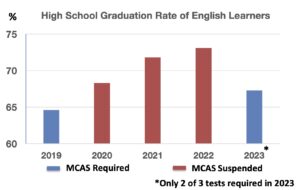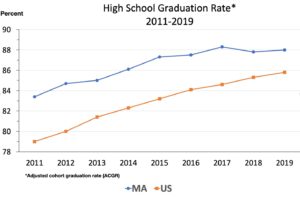CPS invited veteran Cambridge educator Kathy Greeley to read from her memoir and discuss it with participants. In Testing Education, Kathy Greeley recounts the impact of education reform from a teacher’s point of view. Based on a teaching career spanning nearly 40 years, Greeley details how schools went from learning communities infused with excitement, intellectual stimulation, and joy to sterile spaces of stress, intimidation, and fear. In this ultimately hopeful memoir, Greeley asks us to learn from the past to reimagine the future of public education. If you weren’t able to join us, you can view the recording here. → Read More
English Learners’ High School Graduation Rate Drops with the Reinstatement of the MCAS Graduation Requirement
From 2022 to 2023, the four-year high school graduation rate for Massachusetts English Learners declined 5.8 percentage points (from 73.1% to 67.3%), according to a Citizens for Public Schools analysis. This was the largest decline ever recorded for English learners with the current method of calculating graduation rates.* In 2023, the MCAS graduation requirement was reinstated after a three-year suspension because of the pandemic.
The suspension and reinstatement provided a unique opportunity to evaluate the impact of the MCAS graduation tests, especially on vulnerable student subgroups such as English learners.
During the three-year suspension, impressive gains were made in graduation rates, particularly among students who disproportionately fail the MCAS. For example, graduation rates for Black students rose 6.3%, Latinx students rose 6.8%, low-income students rose 4.7%, students with disabilities rose 4.1%, and English learners rose 8.5%. Contrast this with White students’ graduation rate gain of only 0.5%. In other words, the pause in the MCAS graduation requirement coincided with dramatic increases in the graduation rates of historically underserved students. → Read More
CPS open letter to Gov. Healey
Let’s debate the MCAS ballot question with facts
People hold many opinions about the proposed ballot question that would end the requirement that students pass the Massachusetts Comprehensive Assessment System (MCAS) to get a high school diploma. But some things are not a matter of opinion, they are simple facts.
That’s why we were disappointed when Gov. Maura Healey, answering a question about the ballot question, responded that she’s against it because we need “to be able to assess how our young people are doing.”
It’s a simple fact that the ballot question would not eliminate MCAS. The language is clear.
Students would continue to take the federally mandated MCAS exams. But they would get their diplomas by meeting our state’s highly regarded educational standards as certified by their school districts rather than by attaining a certain score on the test.
Right now, there is no consequence for a fourth grader who scores low on the MCAS. → Read More
The Surprising Story about the MCAS and MA’s High School Graduation Rates
By Louis J Kruger
Summary: After 20 years of the MCAS graduation requirement, the debate about requiring high school students to pass the MCAS tests will soon reach a crescendo. Next November, voters may be asked on a statewide ballot to decide if the graduation requirement will be discontinued. Against this backdrop, it is important for voters to know if the graduation requirement has adversely impacted Massachusetts’ overall high school graduation rate and the graduation rate of historically underserved students.
During the two decades prior to the pandemic (2000-2019), Massachusetts‘ overall high school graduation rate improved at a slower pace than the U.S. high school graduation rate. However, focusing on Massachusetts’ overall graduation rate obscures what is happening to students from historically underserved groups. Massachusetts’ graduation gaps for Latinx, Black and low-income students and English learners are all larger than the national average gaps for these students. The aforementioned student groups disproportionately fail the 10th grade MCAS tests required for a high school diploma. → Read More
MCAS tests are not standards
Massachusetts has had world-class, comprehensive K-12 educational standards since the passage of the 1993 Education Reform Act. These standards are deeply embedded throughout our K-12 system. MCAS tests are not state standards. They are limited assessments that address only a small portion of the state standards. Our uniform state standards will continue to shape teaching, learning and assessment, with or without the MCAS graduation requirement. Read our new fact sheet and/or download it below.
→ Read More




